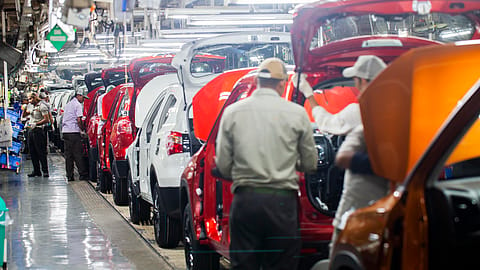Maruti Suzuki to raise capacity at Manesar by 1 lakh units
Maruti Suzuki plans to meet the uptick in demand, which is palpable in both the new launches and the CNG portfolio, where it had more than 20% penetration this quarter.

Maruti Suzuki India Limited (MSIL), India's largest carmaker, is mulling a short-term ramp-up of capacity at its plant in Manesar, in Haryana, to meet demand, the company says in its quarterly earnings call. The ramp-up—which could be realised by April 2024—is expected to act as a stopgap measure until its newest facility at Kharkhoda, near Sonipat, is ready for production. The company has a cumulative capacity of 22.5 lakh units from its facilities in Haryana and Gujarat. It did about 31%, or 1,62,000 units, from the facility in Gujarat—owned directly by Suzuki Motor Corporation in Japan—this quarter.
"Most likely, we might have to add about one lakh capacity on a short-term basis in Manesar to meet intermediate demand. Manesar one lakh might come by April '24 and Kharkhoda in the subsequent year," says Rahul Bharti, executive officer (corporate planning and government affairs). According to him, the first manufacturing plant in the facility at Kharkhoda is slated to have a capacity of 2.5 lakh units per annum. MSIL currently rolls out MPVs like the XL6 and the Ertiga from its Gurugram facility, and models across segments—such as Alto, S-Presso, Celerio, Brezza, and Dzire—from the Manesar facility.
Bharti has also repudiated any claims on curtailing production at the Gurugram plant—which is also the carmaker's oldest facility. "We are not looking at any kind of reduction in Gurgaon, in fact, at least in the shorter term, we might have to increase production in Gurgaon. Our first plant (in Kharkhoda) should be commissioned by the first quarter of calendar '25. And I think we already have to start thinking on the second plant if demand growth continues in India," he explains.
MSIL looks to pull out all the stops to meet its huge 4.1 lakh order book, as of September. "Mostly, we have seen Ertiga has a high waitlist and anecdotally also you keep getting requests for early allotment. Of course, the new models we have discussed, the Baleno also has a high number, and then the other models mostly equally spread," says Bharti. Its order book for CNG vehicles is about 1,30,000-1,40,000 units. However, the company has flagged the substantial price hike of CNG as a headwind. "Fortunately, there hasn't been any impact from price hikes, but there is a cause for concern, because of the high prices and we have presented to the government on this."
MSIL recently unveiled CNG variants of the Baleno and the XL6, and according to Shashank Srivastava, senior executive officer, marketing and sales, MSIL, the carmaker would have introduced newer models a lot sooner had they not been inundated with a substantial order book for CNG. "Our priority was to ramp up the supply of semiconductors for CNG and meet the existing demand," he said at a press conference after the company's quarterly results. Meanwhile, Bharti says that this quarter, MSIL witnessed more than 20% penetration. "But we are engaging with the government to rein in the prices because this has nothing to do with Indian cost. It is only linked to a global index, which has a force majeure kind of situation," he adds.
The company also disclosed that it plans to spend upwards of ₹7,000 crore in capital expenditures this fiscal year. "This includes the Kharkhoda facilities where now we've started our construction work. And, we'll have to place orders with various vendors. So, that will be one major portion of capex. Besides that, all the new model launches that we are doing where we have to have the investment on toolings, etcetera, I think that will be another large piece of capex," explains Ajay Seth, CFO, MSIL.
Bharti also says that the SUV segment is contributing significantly to the company's EBIT margin. "The largest benefit was that it's a premium offering in the SUV space. And what we are excited about is that a fair percentage of the bookings are in the higher variants. And this is both for Grand Vitara and for the Brezza. So, a very good percentage of the bookings are from the upper or the top variants. So, that is positive. And once we have volumes and we have a presence in these segments, profit automatically follows," he explains.
Recommended Stories
Notwithstanding, Seth says that at this point, it is difficult to comment on profitability, as the company is in the thick of expanding its presence in the SUV market. "In the past, with the portfolio being the smaller cars and we were not present in the SUV segment, our profitability was reasonably good." He also adds that MSIL's profitability depends on a myriad of factors, which act in tandem with each other. "It is a combination of what the market can absorb, where you can price your product, and also, when the product matures over a period and as you localise and cost goes down, things change in that interim period."